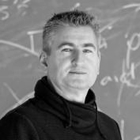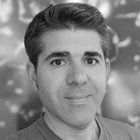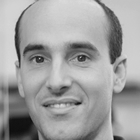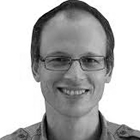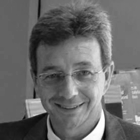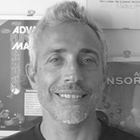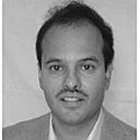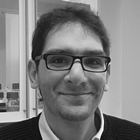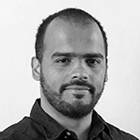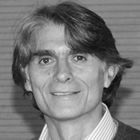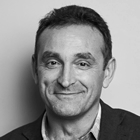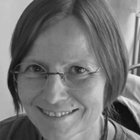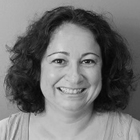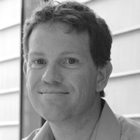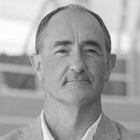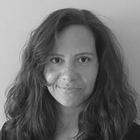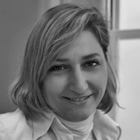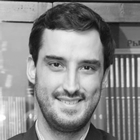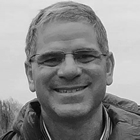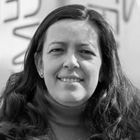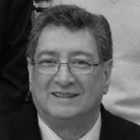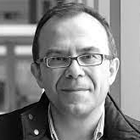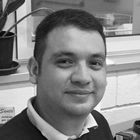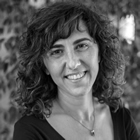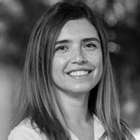 |
 |
|
 |
 |
|
Javier Aizpurua (CFM/CSIC-UPV/EHU-DIPC, Spain)
Javier Aizpurua is a Research Professor of the Spanish Council for Scientific Research (CSIC) at the Center for Materials Physics in San Sebastián, Spain, where he leads the "Theory of Nanophotonics Group" (http//cfm.ehu.eus/nanophotonics). Aizpurua has developed theory to understand the interaction of light and nanostructured materials in a variety of field-enhanced spectroscopy and microscopy configurations, such as in SERS, SEIRA, s-SNOM, STM, or STEM. The understanding of the optical response of complex nanosystems has been the main focus of his research, particularly in the field of optical nanoantennas and nanoplasmonics, with special emphasis on the role of quantum effects in nanophotonics.
|
| MORE INFO |
 |
 |
 |
|
Pablo Ares (UAM, Spain)
Pablo Ares received his B.S. and Master degree in Physics at the Universidad Complutense de Madrid in 2003 and he then joined Nanotec Electrónica S.L. (design, development, and commercialization of scanning probe microscopes, SPMs) as an application scientist. In 2014, he moved to the Department of Condensed Matter Physics of the Universidad Autónoma de Madrid (UAM), where he obtained his Ph.D. in 2017. After this, he joined the Graphene Group at the University of Manchester (UK), to work with Prof. Kostya Novoselov and Dr. Laura Fumagalli as a Marie Sklodowska Curie Fellow. In 2020 he moved back to the UAM, where he is currently a Ramón y Cajal Fellow & IFIMAC Junior Group Leader. His research activity has a marked multidisciplinary character within the framework of nanoscience and nanotechnology, focused on novel low-dimensional systems using and developing SPM tools.
|
| MORE INFO |
 |
 |
 |
|
Julien Bachmann (Friedrich-Alexander-Universität, Germany)
Julien Bachmann studied chemistry at the University of Lausanne, Switzerland, and the Massachusetts Institute of Technology, USA (Ph. D. 2006). He moved with a Humboldt Fellowship to the Max Planck Institute of Microstructure Physics in Germany to learn the chemistry and physics of solids and worked as a postdoc at the University of Hamburg. He started as an Assistant Professor in physics and chemistry in Hamburg in 2009 and was appointed as an Associate Professor of Inorganic Chemistry at Friedrich-Alexander-Universität Erlangen-Nürnberg in 2012. In 2017, he was promoted to Full Professor and he now leads the Chair for ‘Chemistry of Thin Film Materials’ at FAU. Prof. Bachmann was awarded by the European Research Council an ERC Consolidator Grant (2015) and a Proof of Concept Grant (2022). He is also a co-founder and director of the company Atlant 3D Nanosystems.
|
| MORE INFO |
 |
 |
 |
|
Adrian Bachtold (ICFO, Spain)
Adrian Bachtold is the principal investigator of the Quantum NanoElectronics & NanoMechanics group at ICFO in Barcelona. His activities focus on the mesoscopic investigation of both quantum electron transport and mechanical resonators. The work is highly interdisciplinary with possible implications in condensed matter, quantum science, optomechanics, and low-temperature physics. He was awarded with two ERC grants. He is APS fellow and is recipient of the CNRS medal and the IBM award of the Swiss Physical Society. Out of the 23 PhD students and postdoc fellows that worked in his group, 13 of them have a permanent position in academic research
|
| MORE INFO |
 |
 |
 |
|
Miguel A. Bañares (CSIC, Spain)
Bachelor in Chemistry, University Salamanca, Spain, 1989
PhD Chemistry, Univeristy Salamanca, Spain, 1992
HONORARY DOCTORATE “Doctor Honoris Causa”, Université du Caen, Normandie, France, 2017
Miguel A. Bañares is Research Professor, Associate Editor, Catalysis Today (Elsevier, Impact Factor 5.825) and co-Editor of Springer Handbook of Advanced Catalyst Characterization. Obtained his PhD in 1992 (University of Salamanca, 1992). He was Chairman, Management Committee of COST Action D36 (ESF), 2006-2011and is Vice-Chairman, Management Committee of COST Action TD1404 MODENA (ESF). Doctor Honoris Causa, Université de Caen Normandie, France in 2017.
|
| MORE INFO |
 |
 |
 |
|
Giuseppe Barillaro (University of Pisa, Italy)
Giuseppe Barillaro is Full Professor at the Information Engineering Department of the University of Pisa. Research at Barillaro’s group is focused on the preparation of materials, structures, and systems at the micro and nanoscale with applications in the fields of (nano)photonics, microelectronics, (bio)sensing, and (nano)medicine. G. Barillaro is author of more than 100 papers in peer-reviewed international journals and holds over 20 patents (10 issued in US). He has led more than 20 research expenditure, at international and national levels on micro and nanostructured materials and platforms for (bio)sensing and (nano)medicine and since 2022 he is the PI of “RESORB” (https://www.resorb-project.eu) an EIC Pathfinder Open project funded by the EC with 3 M€ for the development of implanted bioresorbable sensor systems for tracking biomarkers and drug in vivo
|
| MORE INFO |
 |
 |
 |
|
Vladimir A. Baulin (URV, Spain)
2013 - : Reseacher - University Rovira i Virgili, Tarragona, Spain
2008: ICREA Junior - University Rovira i Virgili, Tarragona, Spain
2007: Marie Curie postoc - Universitat Rovira i Virgili, Tarragona, Spain
2003-2006: postdoc - Institut Charles Sadron, Strasbourg, France
2003: PhD in physics - Commissariat à l’Energie Atomique, Grenoble, France
2000: Master in physics - Lomonosov Moscow State University, Moscow, Russia
|
| MORE INFO |
 |
 |
 |
|
Rodrigo Calvo (Mecwins, Spain)
Rodrigo Calvo obtained his BSc in Physics and MSc in Photonics from the Universidad Autónoma de Madrid in 2017. He continued his academic career with a PhD at the same institution in the applied physics department, focusing on the study of gold plasmonic structures on silicon substrates for biosensing applications. Later (2020), he started an industrial PhD at the company Mecwins, where he is currently developing a biosensor platform based on dark-field spectrophotometry using plasmonic structures with the innovative Mecwins technology. His research activity is multidisciplinary within nanoscience and fabrication, nanostructure characterisation and plasmonics.
|
| MORE INFO |
 |
 |
 |
|
Carla Casadevall (URV/ICIQ, Spain)
Dr. Casadevall was born in Palafrugell-Girona (Spain) in 1991 and is currently a Ramón y Cajal fellow and a Junior Group Leader at the Universitat Rovira i Virigli (URV) and the Institute of Chemical Research of Catalonia (ICIQ) (Tarrgona, Spain), working on the development of catalyst-functionalized polymeric microreactors for the production of solar fuels and chemicals within artificial photosynthesis. She obtained a BSc in chemistry (2013) and a MSc (2014) in Advanced Catalysis and Molecular Modelling at the University of Girona (Spain). Then she moved to ICIQ to do a PhD (2015-2019) working on homogeneous systems for artificial photosynthesis and photoredox catalysis. During that time, she performed 4 PhD international internships: KTH Royal Institute of Technology (Sweden), Arizona State University (USA), University of Groningen (Netherlands) and MPI-CEC (Germany). After obtaining her PhD she joined the University of Cambridge (UK) in September 2019 as a BBSRC postdoctoral research associate and later as a Marie Marie Skłodowska–Curie Individual Fellow (2020-2022) working on biohybrid systems for artificial photosynthesis. In October 2022 she came back to Spain and started her independent career with a “La Caixa Junior Leader Incoming Fellowship” and recently with a Ramón y Cajal at ICIQ and URV
|
| MORE INFO |
 |
 |
 |
|
Ciro Chiappini (KCL, UK)
Dr Ciro Chiappini is Senior Lecturer in Nanomaterials and Biointerfaces. He joined King’s College London in 2016. His research blends nanotechnology, bioengineering and cell biology to develop functional materials that direct cell behaviour. Dr Chiappini was Marie Curie Fellow and Newton International Fellow at Imperial College London from 2011 until 2016, and holds a doctorate from the University of Texas at Austin. In 2018 he was awarded an ERC Starting Grant. Dr Chiappini has authored more than 40 publications with over 3500 citations across material science and bioengineering and holds international patents.
|
| MORE INFO |
 |
 |
 |
|
Eugenio Coronado (UV - Instituto de Ciencia Molecular (ICMol), Spain)
With over 580 publications amassing 34.392 citations and an H-index of 91, his career has always been characterized by a high interdisciplinarity and impact in chemistry, physics and materials science. Coronado has been at the forefront of Molecular Magnetism during the last 25 years making seminal contributions in the chemical design, physical characterization and theoretical modelling of molecular nanomagnets and multifunctional materials. He leads two ERC AdG in Molecular Spintronics and 2D materials. His relevance goes well beyond Molecular Magnetism and is also strongly appreciated in the areas of Polyoxometalate Chemistry, Molecular Conductors and Superconductors, Molecular Electronics and, more recently, Molecular Spintronics, Quantum Computing (Magnetic Molecules as qubits) and 2D materials. Eugenio Coronado is the Director of the Molecular Science Institute (ICMol) at the University of Valencia and of the European Institute of Molecular Magnetism (EIMM).
|
| MORE INFO |
 |
 |
 |
|
Jose H. Garcia (ICN2, Spain)
Computational physicist with broad experience in applying HPC algorithms in multi-core and GPU-CUDA platforms for quantum transport problems. Over the years I had developed different methods for an efficient extraction of nonequilibrium properties in linear response, with aim in macroscale systems containing millions of atoms. More recently, I had focused on studying the spin-orbit coupling and exchange interplay oriented toward ultralow-power memory applications.
|
| MORE INFO |
 |
 |
 |
|
Ricardo Garcia (ICMM-CSIC, Spain)
Garcia combines theory and experiments to develop advanced force microscopes for the characterization of materials in its broader sense (inorganic, biomolecules, cells, tissues, devices). A key feature of RG’s approach is that nanoscale control and device performance should be compatible with operation in technological environments (air or liquid). He has made major contributions to the development of the most popular AFM method (tapping mode AFM). RG has pioneered the fields of multifrequency AFM and nanomechanical force spectroscopy. He is the inventor of bimodal AFM, which is one the most advanced nanoscale characterization methods. He has founded the Multifrequency AFM conferences. Currently, RG pioneers the development 3D AFM to characterize solid-liquid interfaces. Some of his inventions are commercialized and applied in technological environments and factories.
|
| MORE INFO |
 |
 |
 |
|
Javier Garcia de Abajo (ICREA/ICFO, Spain)
Javier García de Abajo obtained his PhD in condensed matter theory from the University of the Basque Country (Spain) in 1993. After spending three years in Berkeley National Lab., he became a staff scientist at CSIC (Spain) and was promoted to Research Professor in 2008. He is currently an ICREA Research Professor and leader of the Nanophotonics Theory group at ICFO. He has worked in atomic collisions, surface science, electron microscope spectroscopies, plasmonics, and theoretical nanophotonics. He has co-authored 400+ papers that have accumulated 32,000+ citations and an h index of 91 (WoK, Jan. 2022). He is a Fellow of both the American Physical Society and the Optical Society of America.
|
| MORE INFO |
 |
 |
 |
|
Petra Granitzer (Karl-Franzens-University Graz, Austria)
Petra Granitzer degreed in Physics at the University of Graz studying “Mesoporous Silicon as a Matrix for Ferromagnetic Nanostructures”. Then she worked 3 years at Philips in Klagenfurt, Austria before taking a PostDoc position at the Institute of Physics at the University of Graz till 2008. Afterwards she joined the FELMI (Institute for Electronmicroscopy) at the University of Technology in Graz for one year and returned to the Physics Institute at the University of Graz in 2009. Since 2013 she holds a Senior Scientist Position there. Her work focuses on nanostructuring of silicon and the filling thereof with magnetic materials to achieve semiconducting/ferromagnetic composite systems.
|
| MORE INFO |
 |
 |
 |
|
Catherine Journet-Gautier (Université Claude Bernard Lyon 1 / CNRS, France)
After receiving her PhD in condensed matter on "The production of carbon nanotubes" (1998, University of Montpellier, France), Catherine Journet joined the laboratory of Prof. Dr. Klaus Von Klitzing at the Max Planck Institute for Solid State Physics in Stuttgart (Germany) for a post-doctoral stay. She then obtained a position as a lecturer at the University of Lyon in the “Laboratory of Condensed Matter Physics and Nanostructures” to develop the synthesis of nanomaterials. In 2011, she was recruited as a Full Professor at the “Laboratory of Multimaterials and Interfaces” from the University of Lyon, where she develops the elaboration and characterization of one- and two-dimensional inorganic nanostructures (nanotubes, nanosheets), and more particularly the synthesis of 2D nanostructures such as hexagonal boron nitride (h-BN) sheets, which are necessary for the exploitation of electronic properties of graphene. She is in charge of the "Low Dimensional Materials" team of the laboratory. She is also a member of the Senior Advisory Panel of JPhys Materials (IOP) and a member of the Editorial board of Nanomaterials (MDPI).
|
| MORE INFO |
 |
 |
 |
|
Frank Koppens (ICREA/ICFO, Spain)
Prof. Frank Koppens obtained his PhD in experimental physics at Delft University, at the Kavli Institute of Nanoscience, The Netherlands. After a postdoctoral fellowship at Harvard University, Since August 2010, Koppens is group leader at the Institute of Photonic Sciences (ICFO). The quantum nano-optoelectronics group of Prof. Koppens focuses on both science and technology of novel two-dimensional materials and quantum materials. Prof. Koppens is vice-chairman of the executive board of the graphene flagship program, a 1000 MillionEuro project for 10 years. He is also the leader of the optoelectronics workpackage within the flagship. Koppens has received numerous ERC awards: the ERC starting grant, the ERC consolidator grant, and four ERC proof-of-concept grants. Other awards include the Christiaan Hugyensprijs 2012, the national award for research in Spain, the IUPAP young scientist prize in optics, and the ACS photonics investigator award. Since 2018 Koppens is on the Clarivate list for highly cited researchers, in the physics category. Koppens has been elected as fellow of the American Physical Society in 2022. In total, Koppens has published more than 120 refereed papers (H-index 69).
|
| MORE INFO |
 |
 |
 |
|
Luis M. Liz-Marzán (CIC biomaGUNE, Spain)
Luis M. Liz-Marzán is a PhD from the University of Santiago de Compostela and has been postdoc at the van't Hoff Laboratory (Utrecht University) and visiting professor at various institutions worldwide. After an extended academic career at the University of Vigo, in 2012 he joined the Basque Center for Cooperative Research in Biomaterials (CIC biomaGUNE), in San Sebastian, as Ikerbasque Research Professor and Scientific Director, a position he held until December 2021. Since 2015 he is also the PI of the CIC biomaGUNE node of the Biomedical Research Networking Center: Bioengineering, Biomaterials and Nanomedicine (Ciber-BBN) and since 2022 he holds a part-time Chair at the University of Vigo. Luis M. Liz-Marzán is recognized by his work on the application of colloid chemistry to the field of nanoplasmonics. He has been one of the pioneers in the colloidal synthesis of metal nanoparticles, with relevant contributions toward the control over the morphology of such nanoparticles, as well as toward tailoring nanoparticle surface chemistry and self-assembly. Recent work by the group has focused on surface bioconjugation but also on drug delivery and understanding nanoparticle fate within living cells.
|
| MORE INFO |
 |
 |
 |
|
Jan Macak (University of Pardubice and BUT, Czech Republic)
Dr. Jan M. Macak is a Senior Researcher and a group leader at the Center of Materials and Nanotechnologies of the University of Pardubice, Czech Republic and at the Central European Institute of Technology (CEITEC) in Brno, Czech Republic, as the leader of the research group Advanced Low-Dimensional Nanomaterials. He got his Ph.D. in 2008 at the FAU Erlangen-Nuremberh, Germany. He received several prestigious awards and in 2015 also ERC Starting grant „Chromtisol“ devoted to development of new type of solar cells based on nanotubular titania. His research is focused on the synthesis of new low-dimensional structures such as nanotubes, nanolayers, nanofibers, in various ways.
|
| MORE INFO |
 |
 |
 |
|
Silvia Marchesan (University of Trieste, Italy)
PhD in Chemistry at The University of Edinburgh (2008, UK), Pharmaceutical Chemist (2007, UK) & Pharmacist (2006, Italy) qualifications, honorary researcher at UCL (London, 2005-2007), Academy of Finland Fellow at University of Helsinki (2008-2010), CRSS Fellow jointly at Monash University and Commonwealth Scientific Industrial Research Organization, CSIRO (Melbourne, 2010-2012). In 2013 I returned to the University of Trieste where my scientific adventure had started with the M.Sc. degree, (honours). In 2018 I became Associate Professor and received the Habilitation as Full Professor. In 2021-2022 (6 mo.) I have been Visiting Academic the University of Cambridge (UK). Recent awards:
RSC Soft Matter Lectureship (UK) - 2021
EuChemS Org. Chem. Division representative at ACS Fall meeting (US) - 2020
Howard Lecture (Durham, UK) - 2020
Aulin-Erdtman Lecture (KTH, Sweden) - 2019
Nature Chemistry 10th Anniversary Special Issue "Charting a Course for Chemistry" - 2019
Italy's representative at EuChemS Organic Chemistry Division Workshop (Austria) - 2019
Top-11 Rising Star in the natural sciences worldwide (Nature Index) - 2018
JSP Fellowship at Buergenstock Stereochemistry Conference (Switzerland) - 2018
|
| MORE INFO |
 |
 |
 |
|
Marisol Martin (IMN-CNM-CSIC, Spain)
Prof. Marisol Martín-Gonzalez received her PhD in 2000 from the Universidad Complutense de Madrid. After a postdoctoral stay of three years at the University of California at Berkeley, where she worked on nanostructuring materials to improve energy efficiency, she returned to Spain and is currently a Research Professor at the Institute of Micro and Nanotechnology of the CSIC, where she leads the FINDER research group. Prof. Martín González is nowadays, the Scientific Coordinator of the Subject Area of the CSIC, co-founder of the company AD + Particles a spin-off of the CSIC, advisory board and co-founder of the European Thermoelectric Society, and corresponding academic of the RAC. Her research is focused on generating devices that allow for more efficient harvesting and management of heat to produce clean energy. Because of her pioneering work, she obtained her first ERC in 2010. Then, she got an ERC Proof of concept in 2015 to study the commercialization and applicability of the development of three-dimensional alumina matrices as a metamaterial with novel optical, magnetic, and energy properties. More recently, in 2022 she obtained her last ERC Adv to generate electricity from the body heat to power wearable devices. She has been vice director of the Institute de Micro and Nanotecnología and director of the Sensors and Biosensors Department.
|
| MORE INFO |
 |
 |
 |
|
Miguel Moreno (DIPC, Spain)
Miguel Moreno Ugeda is an Ikerbasque research associate at the Donostia International Physics Center (DIPC) in San Sebastián (Spain), where he currently leads the 2DSPM research group focused on strongly correlated phenomena in 2D materials. PhD in Physics in 2011 by the Universidad Autónoma de Madrid (UAM), Spain. In 2012, he joined the Physics Dept. at the University of California at Berkeley (USA) as a postdoctoral fellow. From 2016 to 2018, he was Ikerbasque fellow at CIC nanogune (Spain). In 2017, he was awarded an ERC Starting Grant and moved to the DIPC. Guest scientist at Freie Universität (2006), Osaka University (2006), Max Planck Institute (2008), Aarhus University (2009), Tsinghua University (2016). ASEVA award as the best junior scientist in 2020. He was awarded the ERC Consolidator Grant in 2022.
|
| MORE INFO |
 |
 |
 |
|
Artur Pinto (University of Porto, Portugal)
Artur M. Pinto graduated in Pharmaceutical Sciences, obtaining his PhD in Biomedical Engineering from Faculty of Engineering - University of Porto (FEUP), visiting the University of Washington (USA). Afterward, Artur has been appointed as a Post-Doctoral Researcher at Eindhoven University of Technology, Chemical Engineering Department, the Netherlands. Following his Post-doc, Artur has been awarded a long-term Researcher position at LEPABE-FEUP. He is the Principal Investigator of 2 collaborative projects between FEUP, i3S (Institute for Research and Innovation in Health), and the University of Texas in Austin (USA), focused on developing new 2D-nanomaterials and adjusting their properties for biomedical applications, such as cancer phototherapy, immunotherapy, drug delivery, and 3D-printing for tissue regeneration.
|
| MORE INFO |
 |
 |
 |
|
Danny Porath (The Hebrew University of Jerusalem, Israel)
Prof. Danny Porath Studied for BSc in Physics, Mathematics and Electronics at the Hebrew University. Received his Ph.D in Physics from the Hebrew University in 1997. Did his postdoc at Delft University of Technology with Prof. Cees Dekker and established his NanoBioElectronics group at the Institute of Chemistry of The Hebrew University of Jerusalem in 2001. The group research interests include: DNA-Based Nanoelectronics, scanning probe microscopy and spectroscopy of single molecules, electrical transport measurements in single molecules, nanoelectronics, DNA sequencing and biomarker detection. Member of the Editorial Board of “Self Assembly and Molecular Electronics and of “Scientific Report” from Nature Publishing Group. Received excellent postdoctoral award of the American Vacuum Society Meeting, Boston 2000, and The Israel Chemical Society Prize for the Outstanding Young Scientist in 2007. Holds the Etta and Paul Schankerman Chair of Molecular Biomedicine since 2014. Served as the Director of the Hebrew University Center for Nanoscience and Nanotechnology 2011-2014. Served as Vice Dean Research of the Faculty of Science and Vice Dean International Affairs of the Faculty of Science at the Hebrew University of Jerusalem. Chair of the Nano.IL conference to be held 27-29.2.24
|
| MORE INFO |
 |
 |
 |
|
Celia Rogero (CSIC-UPV/EHU, Spain)
Dr.Celia Rogero is Tenured Researcher of CSIC and Vice-president of the Spanish Vacuum Society (ASEVA) She got her PhD from UAM in 2003. From 2004 to 2009 she was postdoctoral researcher at the Department of Chemistry of the University of Newcastle upon Tyne and Astrobiology Center in Madrid, CAB (INTA-CSIC). She is expert in the study of physico-chemical properties of metal-semiconductor (insulator) interfaces. Her actual main research line, as leader of the Materials for Quantum Technologies Group, is the bottom-up fabrication with atomic precision of devices, specially that involving ferromagnetic semiconductors and superconductors.
|
| MORE INFO |
 |
 |
 |
|
Eduardo Ruiz Hitzky (ICMM-CSIC, Spain)
Eduardo Ruiz-Hitzky is Doctor by the University of Louvain (1974) and by the Complutense University of Madrid (1979). He is currently an Ad Honorem Research Professor at the National Research Council of Spain (CSIC). Since 1987 has been Founder and First Director of several Departments at the CSIC including the “New Architectures in Materials Chemistry Department” created in 2010 at the Materials Science Institute of Madrid (ICMM-CSIC). He was Head of the Hybrid, Biohybrid and Porous Nanostructured Materials team at the ICMM-CSIC (2010-2020)
|
| MORE INFO |
 |
 |
 |
|
Jarno Salonen (University of Turku, Finland)
Jarno Salonen is Professor of Pharmaceutical Physics at the Department of Physics and Astronomy in University of Turku, Finland. He is head of the department and also head of Industrial Physics Laboratory. He has studied porous silicon since 1994. He graduated with a PhD in Physics in 1999 at the University of Turku. His research interests include chemical stabilization of porous silicon, sensor and optical applications, and since 2004 also drug delivery and theranostic applications. He is author of more than 270 scientific publications with over 14 000 citation (h-index = 74, Google Scholar).
|
| MORE INFO |
 |
 |
 |
|
Josep Samitier (IBEC, Spain)
Josep Samitier Martí is director of the Institute for Bioengineering of Catalonia (IBEC), Barcelona (Spain). Full professor at the Department of Electronic and Biomedical Engineering, Faculty of Physics of the University of Barcelona (UB). Background in Physics (M.S. Degree in Physics, University of Barcelona and Ph.D. in Physics, University of Barcelona). Group leader of the Nanobioengineering group at IBEC and group leader in the Centro de Investigación Biomédica en Red de Bioingeniería, Biomateriales y Nanomedicina (CIBERBBN). His work as a researcher focuses on the application of micro- and nanotechnology in the development of new biomedical systems and devices. Coordinator of the Spanish Nanomedicine Platform (NanomedSpain). Scientific coordinator at national level of the Complementary Plan for Biotechnology Applied to Healthcare, which is boosted by the Ministry of Science and Innovation of Spain together with 7 autonomous communities on new tools for precision medicine. President of the Catalan Association of Research Centres (Associació Catalana d'Entitats de Recerca - ACER) and a full member of the Institut d'Estudis Catalans (IEC).He was awarded the City of Barcelona prize in the Technological Innovation category in 2003 and the Narcís Monturiol medal in 2020.
|
| MORE INFO |
 |
 |
 |
|
José G. Sánchez (ICIQ, Spain)
José G. Sánchez is a Postdoctoral Researcher at the Chemical Research Institute of Catalonia (ICIQ) in Tarragona, Spain, within the project Solar Catalysis for a Renewable Energy Future (SOL-FUTURE). He obtained his Ph.D. in Technologies for Nanosystems, Bioengineering, and Energy in 2018 at the Universitat Rovira i Virgili in Tarragona, Spain. During his Ph.D. he moved to the Vrije Universiteit Amsterdam (the Netherlands) for a short-term research stay. His main research focuses on the design, fabrication, and characterization of highly efficient organic, perovskite, and tandem solar cells to power catalyst photoreactors.
|
| MORE INFO |
 |
 |
 |
|
Samuel Sánchez (IBEC, Spain)
Samuel obtained his PhD in Chemistry at Autonomous University of Barcelona in 2008. Currently, he is ICREA Research Professor, Group Leader and Deputy Director at the Institute for Bioengineering of Catalonia. Before that, he worked at the Max Planck Institute for Intelligent Systems Stuttgart, at the Institute for Integrative Nanosciences at IFW Dresden, Germany, and at MANA-NIMS in Japan. He is currently honorary visiting Professor at HIT Harbin in China and Adjunct Professor at POSTECH University in South Korea.
|
| MORE INFO |
 |
 |
 |
|
Sergio O. Valenzuela (ICREA/ICN2, Spain)
Prof. Sergio Valenzuela obtained his PhD in physics in 2001 at the Universidad de Buenos Aires (Argentina) and held research positions at Harvard University and the Massachusetts Institute of Technology (MIT). Since July 2008 Prof. Valenzuela has been an ICREA research professor and leader of the ICN2 Physics and Engineering of Nanoelectronic Devices Group.
His research is focused on the unique properties of materials with nanoscale dimensions, motivated by both their intrinsic scientific interest and their potential for advanced electronic applications. His work encompasses spintronics, quantum computation with superconducting circuits and nanoelectromechanical systems (NEMS). Together with his collaborators, he has pioneered the use of non-local devices to study the spin Hall effect of thermopiles to isolate the magnon drag in ferromagnetic materials, and implemented novel qubit control and spectroscopy methods.
Prof. Valenzuela was awarded the 2001 Giambiagi prize and the 2009 IUPAP Young Scientist Prize in Magnetism for his contributions to the field of spintronics, as well as an ERC Starting Grant in 2012. He has authored over 50 articles (Nature, Science, Reviews of Modern Physics, Nature Materials, Nature Physics, Physical Review Letters, among others), three patents, and five books or book chapters.
|
| MORE INFO |
 |
 |
 |
|
Ester Vázquez Fernández-Pacheco (UCLM, Spain)
Ester Vázquez is Professor of Organic Chemistry in the University of Castilla-La Mancha and Director of the Regional Institute for Applied Scientific Research (IRICA) where she leads a highly interdisciplinary group (MSOC Nanochemistry group). Her scientific interests focus on the synthesis, functionalization and application of carbon nanostructures using non-conventional and sustainable methodologies. Her group succeeded in the preparation of stable suspensions of graphene in water, which has allowed the biological exploration of this form of carbon under physiological conditions and the preparation of smart gels for applications in drug delivery, tissue engineering and soft robotics.
|
| MORE INFO |
 |
 |
 |
|
Katherine Villa Gomez (ICIQ, Spain)
Dr. Villa is group leader at the Institute of Chemical Research of Catalonia (ICIQ). She has a strong multidisciplinary profile gained by working at 8 research centers in Colombia, Spain Czech Republic, and Belgium. Her research areas span from water decontamination, hydrogen generation, selective oxidation processes to light-driven micro/nanoswimmers. She has received important recognitions (MSCA-UNIPD-COFUND, Beatriu de Pinós, Ramón y Cajal, la Caixa Junior Leader, etc) as well as national and international competitive funding, including an ERC Starting Grant 2022 for her project (PhotoSwim). Her research interests include photocatalysis, nanomaterials, renewable energy, micro/nanomotors, and environmental remediation.
|
| MORE INFO |
 |
 |
 |
|
|
 |
|
 |
|



















